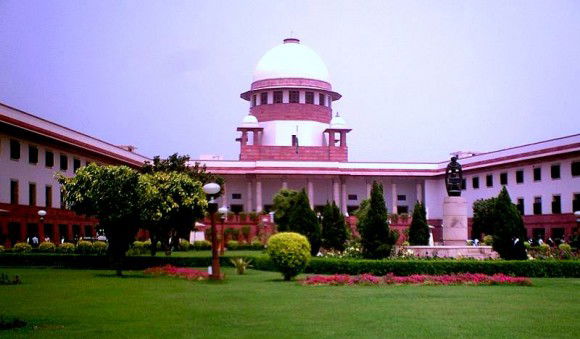Headlines
SC refuses to entertain Swamy's plea for Rama temple at Ayodhya

New Delhi, Feb 26 The Supreme Court on Friday declined to entertain a plea by BJP leader Subramanian Swamy seeking construction of a temple to Lord Rama at the disputed Ramjanmabhoomi-Babri Masjid site in Ayodhya, saying that it was already seized of the matter in a challenge to the Allahabad High Court verdict.
At the outset of the hearing, a bench of Justice V. Gopala Gowda and Justice Arun Mishra asked Swamy, "You want the Rama temple to be constructed at the same place" and "why you should not go to Allahabad High Court".
The Allahabad High court's Lucknow bench by its September 30, 2010, verdict had ruled that the disputed site be divided in three parts - one for Hindus, another for Muslims and the third for Nirmohi Akhara, a Hindu sect and an original litigant in the case.
Asking Swamy if he had filed an intervention application in the matter pending before the top court, the apex court bench said: "We can't touch this (petition seeking enforcement of his right to have Lord Rama's temple at disputed site in Ayodhya) without deciding the civil appeal pending before us."
As Swamy urged the court to consider his plea, the court said: "Your petition is incomplete. Where is the violation of fundamental rights? Without (apex court) deciding the pending civil appeal, where comes the question of your fundamental rights?"
It then converted Swamy's writ petition into an intervention application and tagged it with pending matter wherein all the parties to Ayodhya dispute have challenged the vedict of the Lucknow bench of the Allahabad High Court.
Swamy, in his petition, has contended that under the practices prevalent in Islamic countries, a mosque could be shifted to any other place for public purposes like constructing road etc., whereas a temple once constructed could not be touched.
He said that the disputed mosque in Ayodhya could be shifted to some place across Saryu river and the Lord Rama temple be constructed at the disputed site, contending that the report of the Archaeological Survey of India says that originally there was Lord Rama's temple at the disputed site.
Swamy sought the enforcement of his fundamental right and that of other people belonging to Hindu religion under Article 26 of the Constitution, to seek "the rebuilding and maintenance of the Lord Rama temple at the Ramjanambhoomi site at Ayodhya".
The Lucknow bench of the Allahabad High Court on September 30, 2010, ruled that the Babri Masjid in Ayodhya was built on a site after demolishing a temple on it way back in 1528, and that the spot where a makeshift temple to Ram Lulla was built after razing the mosque in 1992 was indeed where the Hindu god was born.
It ordered that the land around the disputed site would be divided into three parts -- one for Hindus, another for Muslims and the third for Nirmohi Akhara.
The apex court which was moved the Sunni Waqf Board, the Jamait-ul-Ulema-e-Hind, Ramlalla Virajman and Akhil Bharatiya Hindu Mahasabha and Nirmohi Akhara, amongst others, had on May 9, 2011, put on hold the operation of the high court verdict, describing it as a "strange and surprising" order which could not be allowed to remain.
"It is a rare judgment whose operation has to be stayed" and "entirely new dimension was given (to the case) by the high court (by its verdict)", said the then apex court bench of Justice Aftab Alam and Justice R.M. Lodha (both since retired).

5 hours ago
Trump warns that continuation of the Russia-Ukraine war can 'end up in third world war'

10 hours ago
Mumbai University, VES partner to set up CoE in Sindhi language, heritage and culture studies

10 hours ago
Skilling and small enterprises key to boost employment growth in India: NCAER

10 hours ago
Google Korea names ex-Samsung, Apple Korea executive as new chief

10 hours ago
Meta India appoints Aman Jain as new head of public policy

10 hours ago
5G services now available in 99.9 pc of districts: Minister

10 hours ago
Rakesh Bedi reveals why modern cinema is losing its emotional core

10 hours ago
Richa Chadha reflects on challenges of returning to work after embracing motherhood

10 hours ago
Dhanush launches gripping trailer of Vikram Prabhu, L K Akshay Kumar-starrer 'Sirai'

10 hours ago
Nushrratt Bharuccha on owning her choices: 'Yes, I Am an Opportunist'

10 hours ago
Sunny Deol's 'Border 2' to pay tribute to Indian soldiers, teaser to be launched on Vijay Diwas

10 hours ago
Superstar Rajinikanth celebrates 75th birthday on the sets of 'Jailer 2'

10 hours ago
Mom-to-be Sonam Kapoor flaunts baby bump in chic wedding season look






















